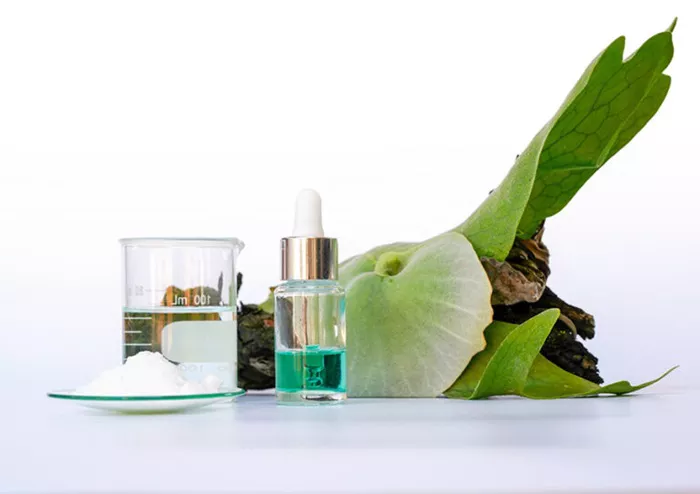Cetyl alcohol is a common ingredient found in a wide variety of skincare and haircare products. It is a fatty alcohol derived from plant oils like coconut or palm oil. Unlike drying alcohols like ethanol, cetyl alcohol is a skin-friendly ingredient that provides numerous benefits for the skin and hair.
What Is Cetyl Alcohol?
Cetyl alcohol is a long-chain fatty alcohol with the chemical formula CH3(CH2)14CH2OH. It is a white, waxy solid at room temperature with a melting point of 49°C (120°F). Cetyl alcohol is insoluble in water but soluble in oils, alcohol, and other organic solvents.
The name “cetyl” comes from the Latin word “cetus” meaning whale, as cetyl alcohol was first isolated from spermaceti, a waxy substance found in the head of the sperm whale. However, modern cetyl alcohol is primarily derived from plant-based sources like coconut or palm kernel oil.
How Does Cetyl Alcohol Work?
Cetyl alcohol functions as an emollient, emulsifier, thickener, and lubricant in skincare formulations. It helps to:
Soften and smooth the skin by forming an occlusive layer that traps moisture
Stabilize emulsions by preventing the separation of oil and water phases
Increase viscosity and provide a rich, creamy texture to products
Improve spreadability and application of products on the skin
Cetyl alcohol is particularly effective at enhancing the skin’s barrier function and preventing transepidermal water loss (TEWL). By forming a protective film on the skin’s surface, it helps to lock in moisture and prevent dryness.
Benefits of Cetyl Alcohol for Skin
1. Moisturizing: Cetyl alcohol is an excellent emollient that helps to soften and smooth the skin. It works by penetrating into the stratum corneum, the outermost layer of the epidermis, and filling in the spaces between corneocytes (dead skin cells). This helps to improve skin hydration and prevent moisture loss.
2. Barrier repair: By forming an occlusive layer on the skin’s surface, cetyl alcohol helps to strengthen the skin’s natural barrier function. This is particularly beneficial for individuals with dry, damaged, or compromised skin barriers.
3. Anti-aging: Some studies suggest that cetyl alcohol may have mild antioxidant properties that can help protect the skin from environmental stressors and free radical damage. This may contribute to its potential anti-aging benefits.
4. Soothing: Cetyl alcohol has a smooth, creamy texture that can provide a soothing and lubricating effect on the skin. This makes it a suitable ingredient for sensitive or irritated skin types.
5. Thickening: As a thickening agent, cetyl alcohol helps to increase the viscosity of skincare products, resulting in a rich, creamy texture that is pleasant to apply and use.
See Also: What Is Retinol Used For In Skin Care?
Benefits of Cetyl Alcohol for Hair
1. Conditioning: Cetyl alcohol helps to smooth the hair cuticle, making hair feel softer, smoother, and more manageable. It can also help to reduce frizz and static.
2. Detangling: The lubricating properties of cetyl alcohol can help to make hair more slippery and easier to comb through, reducing tangles and knots.
3. Volumizing: By coating the hair shaft, cetyl alcohol can help to add body and volume to fine or limp hair.
4. Frizz control: Cetyl alcohol forms a protective barrier around the hair, helping to lock in moisture and prevent frizz caused by humidity.
5. Shine enhancement: The smooth, glossy texture of cetyl alcohol can help to enhance the natural shine and luster of hair.
Applications of Cetyl Alcohol in Skincare and Haircare
Cetyl alcohol is a versatile ingredient that is commonly used in a wide range of skincare and haircare products, including:
Moisturizers: Cetyl alcohol is a key ingredient in many lotions, creams, and serums, where it helps to improve skin hydration and prevent moisture loss.
Cleansers: In cleansing products like face washes and body washes, cetyl alcohol can help to provide a creamy, luxurious lather and prevent the skin from feeling tight or dry after cleansing.
Sunscreens: Cetyl alcohol is often used in sunscreen formulations to help improve the texture and spreadability of the product on the skin.
Shampoos and conditioners: In haircare products, cetyl alcohol helps to improve manageability, reduce frizz, and enhance shine.
Hair styling products: Cetyl alcohol is a common ingredient in hair gels, mousses, and serums, where it helps to provide hold and control while preventing dryness and brittleness.
Makeup products: Cetyl alcohol is sometimes used in makeup products like foundations and powders to help improve the texture and application of the product on the skin.
Safety and Tolerability of Cetyl Alcohol
Cetyl alcohol is generally considered safe for use in skincare and haircare products when used at appropriate concentrations. The Cosmetic Ingredient Review (CIR) Expert Panel has concluded that cetyl alcohol is safe for use in cosmetic products.
In clinical studies, cetylalcohol has been found to have no significant toxicity and is non-irritating to the skin. However, as with any ingredient, there is a small risk of allergic reaction or sensitivity in some individuals.
If you have sensitive skin or are concerned about using cetyl alcohol, it is always best to perform a patch test before using a new product containing this ingredient. If you experience any signs of irritation, such as redness, itching, or burning, discontinue use and consult with a dermatologist.
How to Use Cetyl Alcohol in Skincare and Haircare Routines
Cetyl alcohol is a common ingredient in many over-the-counter skincare and haircare products. When using products containing cetyl alcohol, follow these tips:
1. Always read the ingredient list and usage instructions on the product label to ensure that cetyl alcohol is included and that the product is suitable for your skin or hair type.
2. Start with a small amount and gradually increase usage as tolerated. This can help to minimize the risk of irritation or sensitivity.
3. Use cetyl alcohol-containing products as directed, typically once or twice daily for skincare and as needed for haircare.
4. Store products containing cetyl alcohol in a cool, dry place away from direct sunlight to maintain their effectiveness and prevent spoilage.
5. If you experience any signs of irritation or sensitivity, discontinue use and consult with a dermatologist or healthcare provider.
Conclusion
Cetyl alcohol is a versatile and beneficial ingredient in skincare and haircare products. As an emollient, emulsifier, thickener, and lubricant, it helps to improve skin hydration, strengthen the skin’s barrier function, and provide a smooth, creamy texture to products. In haircare, cetyl alcohol helps to condition, detangle, and add shine and volume to hair. While generally considered safe for use, it is always important to follow usage instructions and discontinue use if any signs of irritation occur. By incorporating cetyl alcohol-containing products into your skincare and haircare routines, you can enjoy the many benefits of this skin-friendly ingredient.
[inline_related_posts title=”You Might Be Interested In” title_align=”left” style=”list” number=”6″ align=”none” ids=”12407,12390,12358″ by=”categories” orderby=”rand” order=”DESC” hide_thumb=”no” thumb_right=”no” views=”no” date=”yes” grid_columns=”2″ post_type=”” tax=””]


































